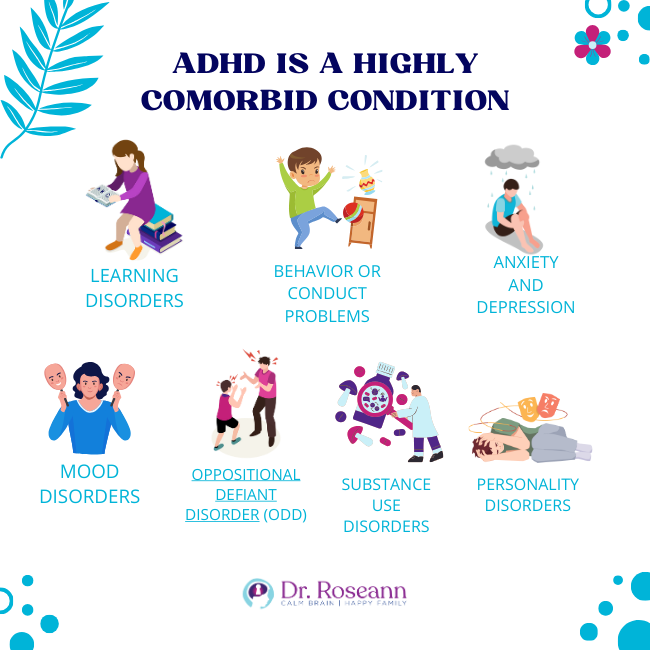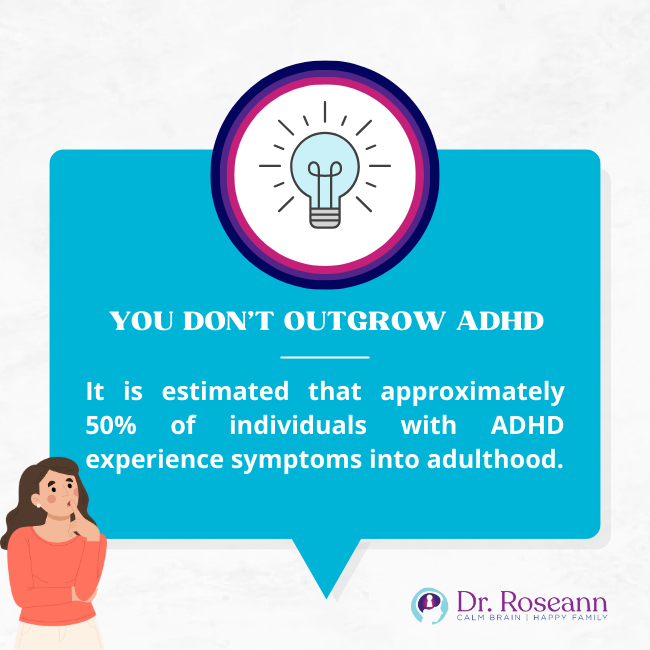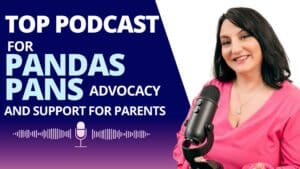Imagine a world where you experience time differently, where your brain functions like a high-speed roller coaster, and every day is a new adventure. Welcome to the world of attention deficit hyperactivity disorder (ADHD). Often misunderstood and misdiagnosed, this complex neurodevelopmental disorder affects millions worldwide. In this blog post, we will delve into 20 essential ADHD facts that everyone should know to better understand and support those living with ADHD.
Key Takeaways
- ADHD is a neurodevelopmental disorder impacting the nervous system, with increasing prevalence in both children and adults.
- It can be accompanied by other mental health conditions, making treatment complex and requiring an individualized approach.
- Effective non-medication treatments exist to help individuals manage symptoms of ADHD while reaching their full potential.
ADHD Facts
Attention deficit hyperactivity disorder (ADHD) is a neurodevelopmental disorder characterized by:
- Difficulty concentrating
- Forgetfulness
- Restlessness
- Anxiety
- Disruptive behavior
- Altered sleep patterns
In some cases, individuals may experience severe ADHD, which can significantly impact their daily lives.
Symptoms usually appear around the age of six, and a health care provider diagnosed prompt intervention can significantly improve disease control and management.
A variety of coexisting conditions may be associated with ADHD, such as social difficulties, challenges in school, and anxiety disorder. The ADHD diagnosis is based on a comprehensive evaluation, and treatment options may include ADHD medication, therapy, or a combination of both.
Studies suggest that ADHD affects up to 11% of children in America. The prevalence of children living in low-income households is a significant contributor to the growth of ADHD cases, with the number of children living with ADHD in the US rising by 42% over the past 8 years.
ADHD Basics: Three Types of ADHD
ADHD can be categorized into three types: inattentive, hyperactive-impulsive, and combined. Each type presents differently, with individuals experiencing a range of symptoms and challenges. This section delves into the distinct aspects of each type and dispels common misconceptions about the disorder.
#1 ADHD is a Neurodevelopmental Disorder
ADHD is classified as a neurodevelopmental disorder, impacting the development and functioning of the nervous system. It is primarily a neurobiological disorder with a strong hereditary component, affecting the:
- Prefrontal cortex
- Neurotransmitters dopamine and norepinephrine
- Frontal lobe
- Superior longitudinal fasciculus (SLF)
- Cortico-limbic areas
- Prefrontal cortex
- Basal ganglia
Research indicates that all these areas are implicated in ADHD.
Individuals with ADHD may experience difficulties with attention, behavior, and self-regulation. This can affect various aspects of a person’s life, including school, work, and relationships.
#2 Brain Dysregulation: Brainwaves
Brainwave dysregulation is a key factor in ADHD, leading to difficulties in focus and attention. Research has indicated that individuals with ADHD have abnormal brainwave patterns, particularly in the beta waves associated with concentration. This dysregulation can consequently lead to difficulty sustaining attention and remaining focused on tasks.
Individuals with ADHD tend to have the following brain differences:
- Lower frequency Theta waves, which are typically associated with relaxation
- Impaired activity in the frontal cortex, responsible for higher-level functions
- Differences in the functioning of the cerebellum, involved in movement regulation
These brain differences contribute to the symptoms and challenges experienced by individuals with ADHD.
#3 We Aren't Diagnosing ADHD in Children and Adults Properly
Diagnosing ADHD accurately in both children and adults is pivotal for effective treatment and management. A comprehensive evaluation is necessary for diagnosing ADHD, which includes interviews with the individual and their parents or relatives, symptom tests, and a medical history evaluation to exclude other conditions.
It is estimated that up to 11% of children in America have been diagnosed with ADHD. The number of children living with ADHD in the US has risen by 42% over the past 8 years, with the prevalence of children living in low-income households being a significant contributor to the growth of ADHD cases.
Unfortunately, we often misdiagnose ADHD when we should look at other reasons why attention could be impaired. Common issues that could cause attention issues include anxiety, mood issues, learning issues, medical problems, and so on.
#4 ADHD is a Highly CoMorbid Condition
ADHD often coexists with other mental health conditions, making treatment more complex. The most prevalent mental disorders that are known to often coincide with ADHD include:
- Learning disorders
- Behavior or conduct problems
- Anxiety and depression
- Mood disorders
- Oppositional defiant disorder (ODD)
- Substance use disorders
- Personality disorders

The prevalence of comorbid conditions in individuals with ADHD varies, with substance use disorder ranging from 2.3% to 41.2%, anxiety disorders at 37.9%, and other disorders also present. These coexisting conditions add complexity to the treatment process, underscoring the need for a thorough and individualized approach to managing ADHD, as highlighted by the national comorbidity survey replication.
#5 ADHD Does Not Only Affect Children
Not only children but also adults are affected by ADHD, with a considerable number experiencing symptoms well into adulthood. Research has estimated the prevalence of ADHD in adults to be around 2.8%, based on DSM-IV criteria. However, prevalence estimates may vary depending on the population studied and the diagnostic criteria applied.
Adults with adult ADHD may experience the following symptoms:
- Difficulty paying attention
- Impulsiveness
- Restlessness
- Carelessness
- Lack of attention to detail
- Poor organizational skills
- Forgetfulness
- Procrastination
- Chronic restlessness
- Difficulty focusing
The severity of these symptoms can vary and may evolve over time.
#6 Medication isn't the Only ADHD Treatment Solution
Besides medication, therapy, supplements and lifestyle modifications can also serve as beneficial treatment options for ADHD. Cognitive-behavioral therapy (CBT) has been demonstrated to be an effective treatment option for ADHD, helping individuals learn new behaviors and manage their symptoms.
Additionally, combining therapy with brain calmers such as magnesium, neurofeedback or PEMF can yield greater improvements in ADHD symptoms, attention, and self-esteem.
#7 People With ADHD Can Pay Attention
People with ADHD can focus, but often struggle with maintaining attention on uninteresting tasks. This is due to the unique way their brains function, with abnormalities in brainwave patterns that impact their ability to concentrate and maintain focus.
However, when engaged in an activity that interests them, individuals with ADHD can exhibit a unique strength known as hyperfocus, where they become deeply absorbed in their chosen activity.
#8 People with ADHD Often Have a Higher IQ Than Average
Individuals with ADHD often have higher IQs than average, showcasing their potential for success. Research has indicated that those with ADHD may possess a full-scale IQ of more than 120. However, it is worth noting that ADHD symptoms may interfere with IQ testing.
Notable individuals with ADHD who have leveraged hyperfocus to their gain include:
- Howie Mandel
- Salma Hayek
- Ty Pennington
- Michael Phelps
- Karina Smirnoff
- Adam Levine
- Justin Timberlake
- Paris Hilton
- Simone Biles
These individuals exemplify the incredible potential that lies within those living with ADHD, and the unique strengths they possess that can lead to extraordinary achievements.
#9 Hyperfocusing Can Be a Superpower
Hyperfocusing can be a strength for individuals with ADHD, as it enables them to become deeply immersed in a task or activity. This intense focus can result in increased productivity and the ability to complete more work in a shorter period of time. Additionally, hyperfocus can motivate individuals with ADHD to pursue their passions and interests with great zeal.
Scientific studies have demonstrated that hyperfocus can be a beneficial trait for individuals with ADHD. For instance, a study published in 2020 found a correlation between ADHD and hyperfocus that was independent of medication effects.
Additionally, a study of 623 adults revealed a strong association between ADHD symptoms and experiences of hyperfocus. These studies provide evidence to support the concept of hyperfocus as a superpower for people with ADHD.
#10 There is a Gender Disparity With ADHD
Gender disparities exist in ADHD diagnosis, with boys more likely to be diagnosed than girls. Research indicates that ADHD symptoms may present differently in girls, making them more difficult to identify. Girls with ADHD may display more subtle symptoms, which can lead to underdiagnosis or misdiagnosis.
Research suggests that males are more likely to be diagnosed with ADHD than females, with a male to female ratio of approximately 4:1 in community samples. However, there is evidence indicating that girls and women with ADHD may be underdiagnosed and undertreated.
#11 You Don't Outgrow ADHD

ADHD is not outgrown; symptoms can persist into adulthood and require ongoing management. It is estimated that approximately 50% of individuals with ADHD experience symptoms into adulthood. These enduring symptoms can include:
- Difficulty paying attention
- Impulsiveness
- Restlessness
- Difficulty maintaining focus
- Disorganization
- Relationship issues
- Lack of focus
- Restlessness and anxiety
- Emotional issues
- Hyperfocus
- Fidgeting
- Chronic restlessness
- Tendency to take unnecessary risks
#12 ADHD is The Top Developmental Condition Today
ADHD is the most common developmental condition today, affecting millions worldwide. It is the most prevalently diagnosed mental or developmental condition among children in the U.S., outnumbering those identified with any other mental or developmental condition. Adolescent psychiatry, in particular, has seen a significant increase in ADHD diagnoses.
Given its broad impact, it’s paramount to heighten awareness, understanding, and support for those living with ADHD and their families.
#13 ADHD Brains Function Differently: Brain Communication
ADHD brains function differently, with altered communication between brain regions. Research suggests that the following factors may be associated with the changes in brain communication seen in ADHD patients:
- Alterations in the prefrontal cortex
- Dopamine transporter levels
- Functional connectivity in certain brain regions
- Differences in brain structure, chemistry, and networks
These alterations may account for some of the symptoms experienced by individuals with ADHD.
#14 Low Magnesium is Associated With Focus Problems
Low magnesium levels are associated with focus problems, highlighting the importance of proper nutrition. Magnesium is essential for nerve transmission and neuromuscular conduction in the brain, and a deficiency can lead to decreased cellular messaging and increased inflammation in the brain.
Maintaining appropriate magnesium levels is vital for optimal focus and concentration.
#15 Rejection Sensitive Dysphoria Commonly Co-Occurs With ADHD
Rejection sensitive dysphoria is a common co-occurring condition with ADHD, causing heightened emotional sensitivity. It is believed that RSD is a consequence of the emotional dysregulation associated with ADHD, which can manifest as difficulty controlling feelings and emotional responses.
RSD can present similarly to mood disorders, as described in the Diagnostic and Statistical Manual, and is characterized by heightened emotional sensitivity and pain.
#16 Executive Functioning Skills Be Learned
Executive functioning skills can be learned and improved, helping those with ADHD manage their symptoms. These cognitive abilities include:
- Organization
- Planning
- Attention
- Problem-solving
By enhancing these skills, people with ADHD can more effectively manage their time, stay focused, and complete tasks more proficiently.
This can result in decreased impulsivity, improved self-control, and improved overall functioning in everyday life.
#17 People With ADHD are Prone to Emotional Dysregulation
Emotional dysregulation is common in individuals with ADHD, leading to challenges in managing emotions. Individuals with ADHD may experience difficulties in managing and regulating emotions, potentially resulting in emotional dysregulation, including negative affect, temper outbursts, and struggles with frustration tolerance.
This phenomenon is observed in both children and adults, particularly in cases of children with ADHD, which is often referred to as childhood ADHD.
#18 Medication Isn't the Only Effective ADHD Treatment Option
For managing ADHD, non-medication treatment options such as therapy and lifestyle changes can prove effective. Some commonly used therapies for treating ADHD include:
- Cognitive Behavioral Therapy (CBT)
- Neurofeedback
- PEMF
- Dialectical Behavioral Therapy
- Mindfulness-Based Cognitive Therapy
- Occupational Therapy
- ADHD Coaching
In addition to therapy, lifestyle modifications such as obtaining adequate sleep, consuming a nutritious diet, and engaging in regular physical activity can also help manage ADHD symptoms.
#19 The Right Diet Can Improve ADHD Symptoms
Opting for a healthy diet can alleviate ADHD symptoms, thereby underscoring the significance of proper nutrition. Studies have demonstrated that Omega-3 fatty acids may be beneficial in managing ADHD symptoms, as they support brain health and can help to reduce symptoms including hyperactivity, impulsivity, and inattention.
Furthermore, research has explored the relationship between sugar intake and ADHD symptoms, with some studies indicating that higher sugar intake could have a negative effect on ADHD symptoms.
#20 Low Motivation and ADHD
Low motivation is a common challenge for those with ADHD, requiring support and strategies for improvement. Potential causes of low motivation in individuals with ADHD may include difficulty recognizing rewards, alterations in brain structure and function, and other factors such as mental health conditions and life phases.
Strategies to enhance motivation may include establishing achievable objectives, dividing tasks into smaller components, providing rewards and incentives, and consulting a professional.
Conclusion: Surprising ADHD Facts You Don't Know
We hope that this exploration of 20 essential ADHD facts has provided you with a deeper understanding of this complex condition. From debunking common myths to recognizing the unique strengths and challenges faced by those with ADHD, our aim is to increase awareness, improve diagnosis, and enhance treatment options for those affected by ADHD.
Frequently Asked Questions
Why should I know about these ADHD facts?
ADHD is a common disorder, with symptoms ranging from tooth grinding and poor memory to difficulty focusing and controlling impulses. It affects both children and adults, and there are many surprising facts about it worth knowing.
Is ADHD an illness or coping mechanism?
ADHD is a long-term, chronic brain condition that causes executive dysfunction and disrupts a person's ability to manage their behavior. This indicates that ADHD is an illness, not a coping mechanism.
What percent of the population has ADHD?
ADHD is estimated to affect around 3.5-5% of the population in the United States, with men more likely to be diagnosed than women and white people more likely to be diagnosed than other ethnic groups. Worldwide estimates from the World Health Organization put the prevalence at 2.5-5%.
Can ADHD be treated without medication?
Yes, ADHD can be effectively treated without the use of medication through therapeutic interventions such as PEMF, neurofeedback, behavioral therapy, supplements and nutrition and lifestyle modifications.
Citations
Ashinoff, B. K., & Abu-Akel, A. (2021). Hyperfocus: the forgotten frontier of attention. Psychological research, 85(1), 1–19. https://doi.org/10.1007/s00426-019-01245-8
Centers for Disease Control and Prevention. (2021, March 26). Data and Statistics About ADHD. https://www.cdc.gov/ncbddd/adhd/data.html
Ishii, S., Takagi, S., Kobayashi, N., Jitoku, D., Sugihara, G., & Takahashi, H. (2023). Hyperfocus symptom and internet addiction in individuals with attention-deficit/hyperactivity disorder trait. Frontiers in psychiatry, 14, 1127777. https://doi.org/10.3389/fpsyt.2023.1127777
Rohner, H., Gaspar, N., Philipsen, A., & Schulze, M. (2023). Prevalence of Attention Deficit Hyperactivity Disorder (ADHD) among Substance Use Disorder (SUD) Populations: Meta-Analysis. International journal of environmental research and public health, 20(2), 1275. https://doi.org/10.3390/ijerph20021275
Are you looking for SOLUTIONS for your struggling child or teen?
Dr. Roseann and her team are all about science-backed solutions, so you are in the right place!
Grab your complimentary copy of
147 Therapist-Endorsed Self-Regulation Strategies for Children: A Practical Guide for Parents
You can get her books for parents and professionals, including: It’s Gonna Be OK™: Proven Ways to Improve Your Child’s Mental Health, Teletherapy Toolkit™ and Brain Under Attack: A Resource For Parents and Caregivers of Children With PANS, PANDAS, and Autoimmune Encephalopathy.
If you are a business or organization that needs proactive guidance to support employee mental health or an organization looking for a brand representative, check out Dr. Roseann’s professional speaking page to see how we can work together.
Dr. Roseann is a Children’s Mental Health Expert and Licensed Therapist who has been featured in/on hundreds of media outlets including The Mel Robbins Show, CBS, NBC, PIX11 NYC, Today, FORBES, CNN, The New York Times, The Washington Post, Business Insider, Women’s Day, Healthline, CNET, Parade Magazine and PARENTS. FORBES called her, “A thought leader in children’s mental health.”

She coined the terms, “Re-entry panic syndrome” and “eco-anxiety” and is a frequent contributor to media on mental health.
Dr. Roseann Capanna-Hodge has three decades of experience in working with children, teens and their families with attention-deficit hyperactivity disorder (ADHD), autism, concussion, dyslexia and learning disability, anxiety, Obsessive Compulsive Disorder (OCD), depression and mood disorder, Lyme Disease, and PANS/PANDAS using science-backed natural mental health solutions such as supplements, magnesium, nutrition, QEEG Brain maps, neurofeedback, PEMF, psychotherapy and other non-medication approaches.
She is the author of three bestselling books, It’s Gonna Be OK!: Proven Ways to Improve Your Child's Mental Health, The Teletherapy Toolkit, and Brain Under Attack. Dr. Roseann is known for offering a message of hope through science-endorsed methods that promote a calm brain.
Her trademarked BrainBehaviorResetⓇ Program and It’s Gonna be OK!Ⓡ Podcast has been a cornerstone for thousands of parents facing mental health, behavioral or neurodevelopmental challenges.
She is the founder and director of The Global Institute of Children’s Mental Health, Neurotastic™Brain Formulas and Dr. Roseann Capanna-Hodge, LLC. Dr. Roseann is a Board Certified Neurofeedback (BCN) Practitioner, a Board Member of the Northeast Region Biofeedback Society (NRBS), Certified Integrative Mental Health Professional (CIMHP) and an Amen Clinic Certified Brain Health Coach. She is also a member of The International Lyme Disease and Associated Disease Society (ILADS), The American Psychological Association (APA), Anxiety and Depression Association of America (ADAA) National Association of School Psychologists (NASP), International OCD Foundation (IOCDF).
© Roseann-Capanna-Hodge, LLC 2023











